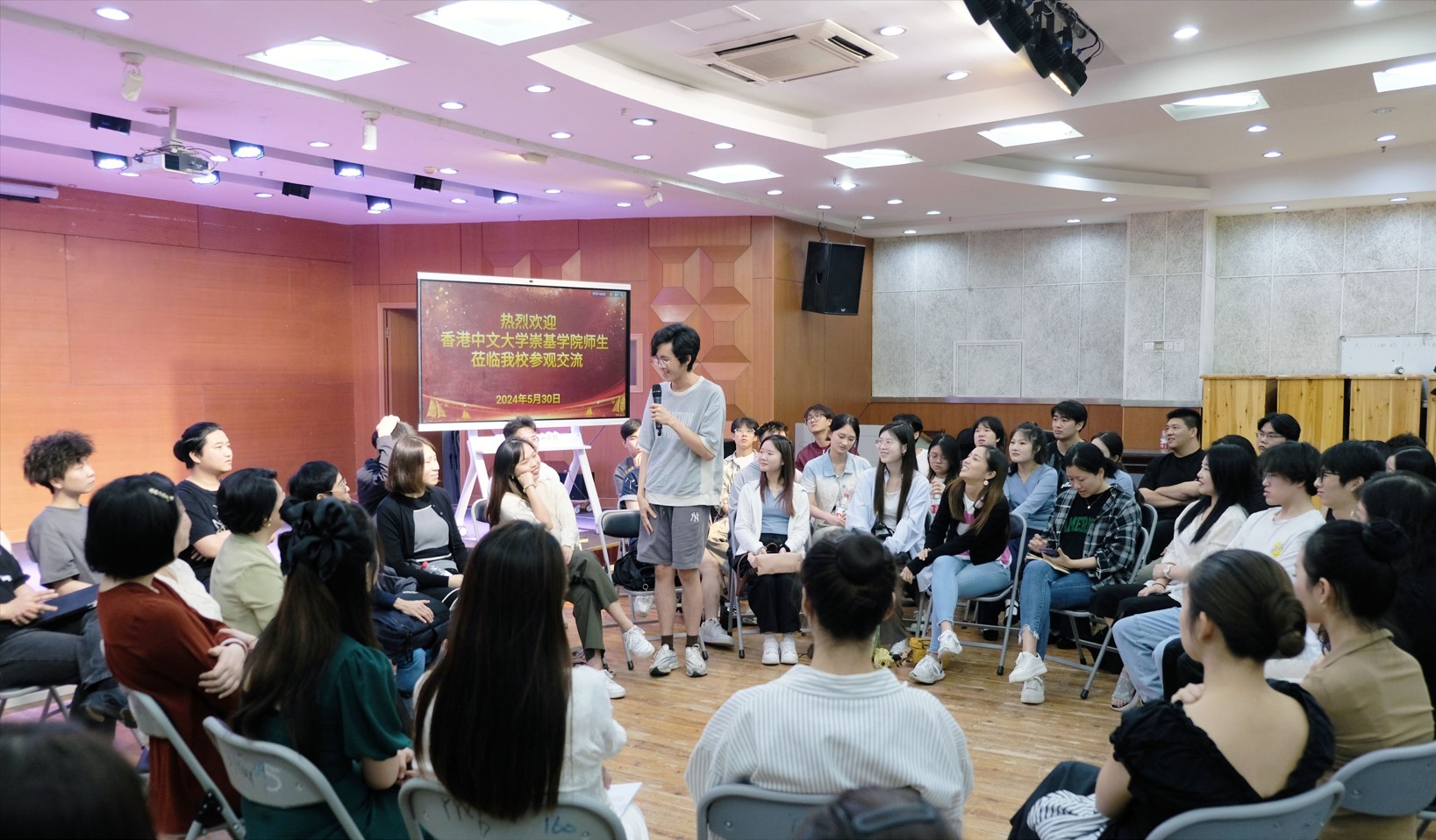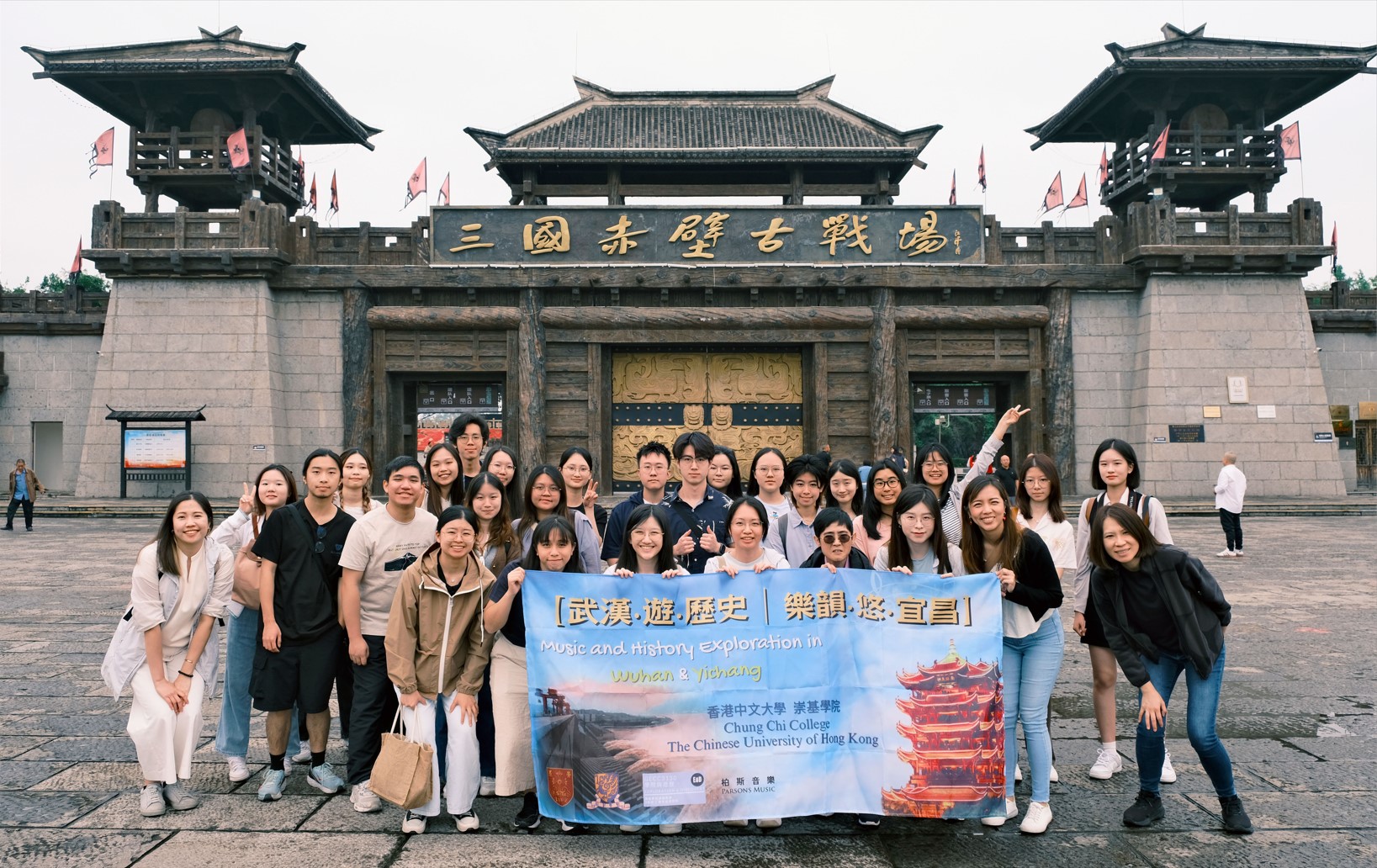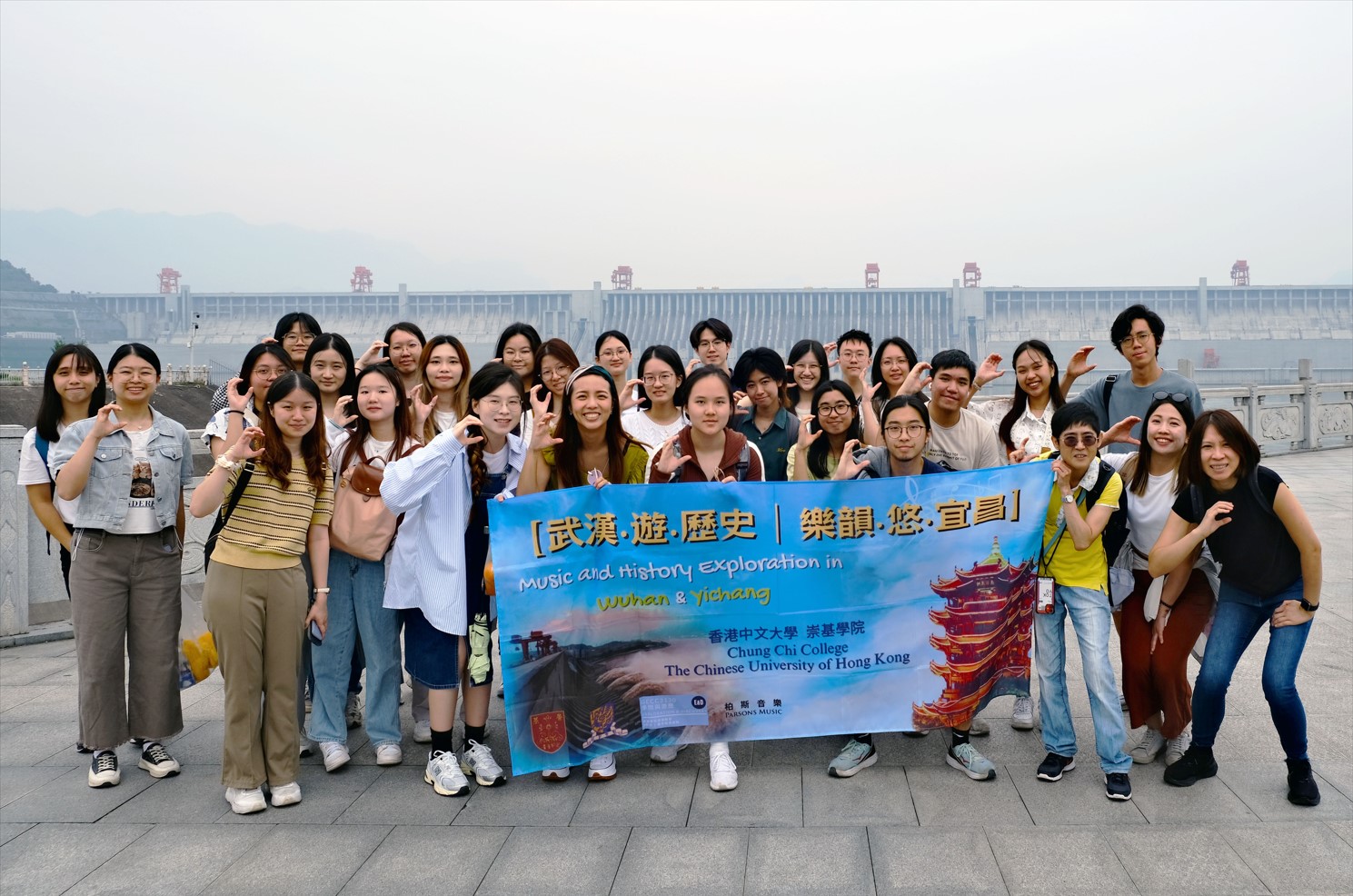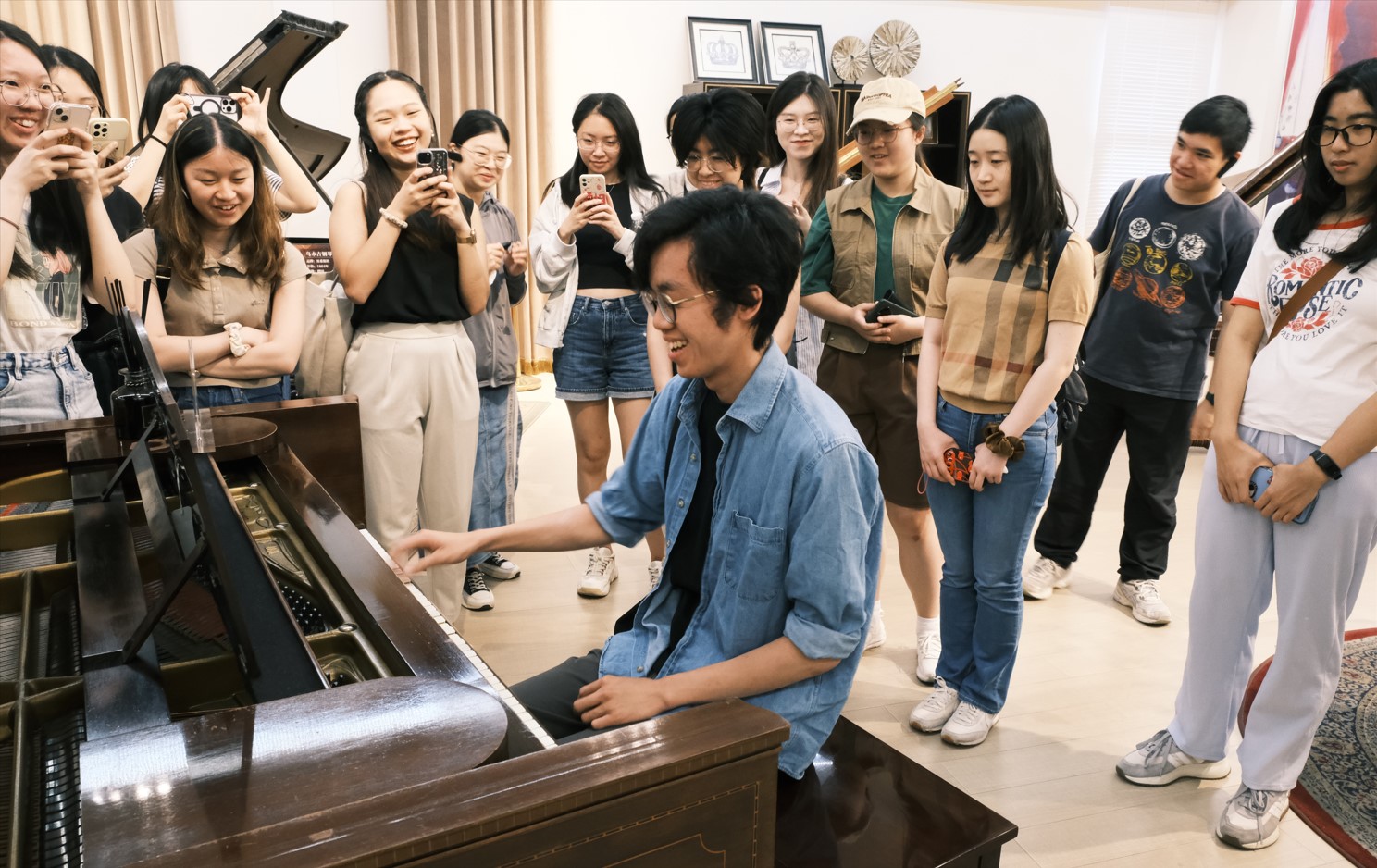

This summer, a group of Chung Chi students undertook a 7-day trip to two cities in Hubei to explore the local histories and music education. The trip, entitled “Music and History Exploration in Wuhan and Yichang”, was one of the interdisciplinary courses organized by the Chung Chi College. It brought together students from various academic backgrounds, facilitating the exchange of their insights and thoughts during the trip and ensuring a fruitful learning experience.
Hubei is a major hydroelectric power generation centre in China, home to the renowned Three Gorges Dam. Yichang is the capital of China’s piano where the national piano brand “Yangtze River Piano” was established. This brand is highly sought-after among musicians in China and abroad, and is frequently featured in international music events.
In-depth Exchanges on Music Education
The Chung Chi exchange group visited Hubei College of the Arts in Wuhan and Yi Chang Shi Ren Wen Yi Shu Gao Zhong (Yichang Humanities and Arts High School). Through appreciating the music and dance performances prepared by the local teachers and students as well as participating in the exchange session after the performances, the Chung Chi students were able to understand the differences in cultural and music education between the Mainland China and Hong Kong.
The teachers at the institutions have a diverse range of educational backgrounds, including overseas returnees and graduates of renowned music academies in China. The most impressive teacher was one who studied in the United States for more than ten years. She returned to China to teach after she had left the country at a young age. Indeed, many teachers in China studied music abroad, which reflects the aspiration of the younger generation of Chinese who have studied abroad to contribute to their country.
The music education curriculum in Mainland China places a strong emphasis on Chinese music. Even students who have chosen to major in Western instruments are required to play Chinese music in their courses. In contrast, Hong Kong students are primarily exposed to Western music and are unfamiliar with Chinese music. During the exchange session, the Chung Chi students discussed the similarities and differences in music education between the two locations. Despite the cultural differences, teachers and students could perceive a passion for music and art - regardless of where they live and what their backgrounds are, the common language of music can always connect everyone.

During the exchange session at Hubei College of the Arts, teachers and students from both sides were eager to ask questions and share insights to deepen the understanding of music education between the two places.
Visiting Cultural Heritage Site with Fascinating History
In addition to visiting local schools, the teachers and students of the Chung Chi exchange group had the opportunity to take a night tour of the Yellow Crane Tower, which provided them with a deeper understanding of the history and artistic essence of this ancient building.
Strolling along the stone steps of the building, the teachers and students felt as if they were travelling back in time. The building houses a collection of poems, paintings and calligraphy written by literati and scholars throughout the ages. The spectacular dance performances and lighting effects filled the space with a rich cultural atmosphere and enhanced the visibility of the artefacts, and further demonstrating the essence of ancient Chinese art.
The group subsequently proceeded to the highest level of the Yellow Crane Tower for an evening view of Wuhan. The contrast between the city’s glittering lights and the ancient and magnificent building is striking, but it is also a wonderful blend of the present and the past, which makes people marvel at the unique charm of the city.
Since ancient times, the Yellow Crane Tower has been a place of poetic creation and has inherited the achievements of ancient Chinese art. Strolling in such an environment, everyone seemed to hear the chant from ancient literati, and gained a deeper understanding of traditional Chinese culture.

The group took a photo in front of the Battlefield of Red Cliffs in the Three Kingdoms.
Visiting China’s Cutting-edge Hydraulic Engineering
The Three Gorges Dam in Yichang, Hubei Province, is the largest hydroelectric project in the world and is a testament to China’s outstanding achievements in the field of hydraulic engineering. The construction of the dam has successfully controlled the flooding of the Yangtze River and significantly reduced flood in downstream areas. It has also provided China with a continuous supply of clean energy, thus contributing to the sustainability of the country’s economy.
Standing at the top of the dam, teachers and students of the Chung Chi exchange group were able to gaze at the Yangtze River and the impressive structure, marvelling at the harmonious relationship between humanity and the natural environment that it embodies. With a length of 2,335 meters and a height of 181 meters, the magnificence of the Dam is breathtaking. Its multiple functions, including navigation, water supply and tourism promotion, demonstrate its comprehensive benefits and significant contributions to society.
Through this visit, we not only witnessed the grandeur of this great project, but also deeply felt China’s endeavour to promote sustainable development and the importance of technology in improving quality of life.

The group visited the Three Gorges Dam to understand more about the largest hydroelectric project in the world.
Piano Capital of China: Parsons Piano Factory
The visit to the piano factory of Parsons Music Corporation in Yichang was one of the highlights of the trip, and one that most of the Chung Chi students were looking forward to. The factory is one of the world’s largest piano producers. During the visit, a guide was available to explain the piano making process to teachers and students. The first half of the tour focused on the assembly of large parts of the piano, while the second half was about the production and assembly of the fine parts. After the visit, many students were surprised to discover that they had no prior knowledge about the piano they used every day.
Towards the end of the tour, the guide directed the group to the concert hall within the Parsons Piano Factory. The hall, which is spacious and brightly lit, featured a grand piano crafted by Yichang Parsons Piano Factory. Several Chung Chi students performed their favourite musical pieces for their peers, against the backdrop of the spectacular Yangtze River.
This trip to Hubei brought Chung Chi students valuable cross-cultural exchanges and artistic inspiration. They gained a deeper understanding of Hubei’s unique history and music, and were inspired by the exchanges with their partners. This study tour was undoubtedly a valuable experience for all participants and will surely become one of the most important memories for all of them.

A student was eager to demonstrate his technique in the piano factory.
Student Reporters Lee Pui Kai Peggy & Cheung Yan Tung